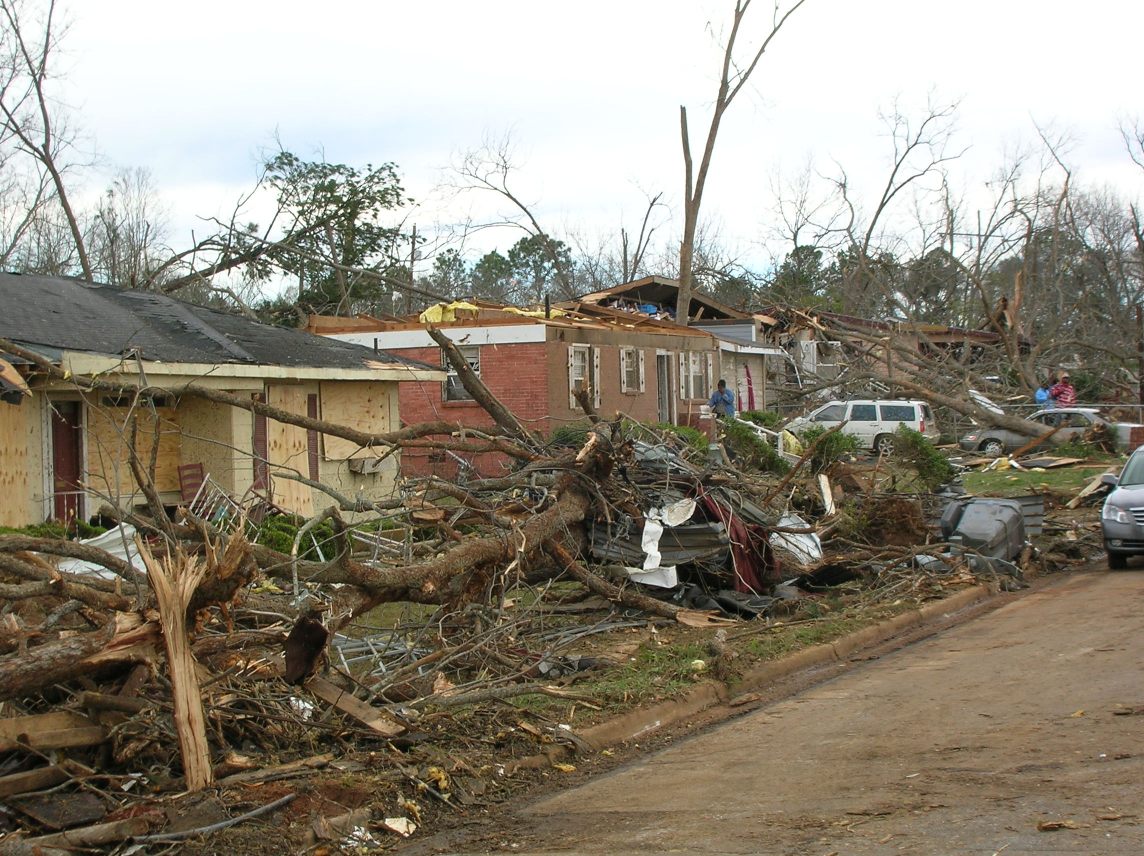Ok. The storm is over. You and your family were prepared and came through in good shape. But, there is property damage. Utilities are out. Are the roads blocked? Maybe there are flood waters to deal with. You're in the aftermath and there are still risks to your safety.
Knowing what to do in the wake of a severe storm or disaster may be just as important to you and your family as taking proper actions ahead of the storm. A study of injuries after a tornado in Marion, Illinois, showed that 50 percent of the tornado-related injuries were suffered during rescue attempts, cleanup, and other post-tornado activities. Nearly a third of the injuries resulted from stepping on nails. Any storm that damages power lines, gas lines, or electrical systems, puts you at risk due to fire, electrocution, or an explosion.
- Be aware of hazards from exposed nails and broken glass.
- Do not touch downed power lines or objects in contact with downed lines. Report electrical hazards to the police and the utility company.
- If it is dark when you are inspecting your home, use a flashlight rather than a candle or torch to avoid the risk of fire or explosion in a damaged home.
- If you see frayed wiring or sparks, or if there is an odor of something burning, you should immediately shut off the electrical system at the main circuit breaker if you have not done so already.
- If you smell gas or suspect a leak, turn off the main gas valve, open all windows, and leave the house immediately. Notify the gas company, the police or fire departments, or State Fire Marshal's office, and do not turn on the lights, light matches, smoke, or do anything that could cause a spark. Do not return to your house until you are told it is safe to do so.
- For more information, visit the Centers for Disease and Prevention. They have a wealth of information about what to do in the aftermath of all sorts of events - like tornadoes, floods, hurricanes, and many more.
After a storm hits, you may need to find a contractor to fix damage to your home or business, but the fear of victimization from contractor fraud can make this difficult. The National Center for the Prevention of Home Improvement Fraud (NCPHIF) says that the key is being thoughtful versus reactive and desperate. Unscrupulous and illegal contractors prey on homeowners who are uninformed, ill-prepared, and unable to protect themselves. When you are informed, ask questions, and remain calm while finding a contractor to repair your home, you are minimizing the opportunity of being victimized by contractor fraud and may be protecting your neighbors too. A contractor that is trying to get away with fraud will run if he thinks you may be the one to catch him before he acts! Here are some helpful hints from NCPHIF for hiring a contractor.
- DO contact multiple contractors yourself and obtain multiple estimates for repair.
- DO NOT hire a contractor that is going door to door and DO NOT hire them based on the lowest estimate. Make sure all estimates include the same detail and descriptions for material and labor costs associated with your project. A project estimate should include all of this information.
- DO obtain each contractor’s contact and business information including: Exact business name as registered with the Secretary of State, Contractor’s name, Business Address, Business Phone, Cell Phone, Website, Insurance Coverage information, Business License #, and Contractor’s License #, if applicable.
- DO NOT hire a contractor that is missing any of this information. A reputable contractor will expect you to ask for all of this.
- DO NOT confuse a Business License with a Contractor’s License. In most states, all businesses must have a business license. A business license is NOT a contractor’s license. In states that do license contractors, a reputable contractor must have both if the project requires a contractor’s license and they must be valid and up to date.
- DO get more than 3 customer referrals for similar projects and CALL THEM to ask questions about the project, any conflicts and any resolutions. Ask if building permits were pulled and if possible confirm that they were online.
- DO NOT assume these are real referrals. They may be family, friends etc. A good referral is someone who has used the contractor professionally on their home.
- DO call your Insurance Agent to verify the contractor’s insurance coverage is valid, appropriate for the work to be done, and will not leave any coverage gaps that may leave you liable should issues occur.
- DO NOT allow the contractor to file your insurance claim for you.
- DO require a formal typed contract that includes: all contact information, license numbers, breakdown of labor and supplies, a full scope of work, guarantees or warranties on materials and workmanship, procedures for change orders, start and completion dates, payment plan based on stages of work completed, an exit clause, and a right to cancel.
- DO NOT accept a handwritten contract, or a typed one with blank spaces, that is missing the above items.
 Here are just a few safety tips...
Here are just a few safety tips...